
Viscount Hardinge, of Lahore and of Kings Newton in the County of Derby, is a title in the Peerage of the United Kingdom. It was created in 1846 for the soldier and Tory politician Sir Henry Hardinge. His son, the second Viscount, represented Downpatrick in Parliament. His great-great-grandson, the sixth Viscount, succeeded a distant relative as eighth Baronet, of Belle Isle in the County of Fermanagh, in 1986. This title had been created in the Baronetage of the United Kingdom 1801 for Richard Hardinge. He was the third son of Nicolas Hardinge, younger brother of Reverend Henry Hardinge and uncle of the latter's third son Henry Hardinge, 1st Viscount Hardinge. The baronetcy was created with special remainder to the heirs male of Richard Hardinge's father.

Baron Avebury, of Avebury in the County of Wiltshire, is a title in the Peerage of the United Kingdom. It was created 22 January 1900 for the banker, politician and archaeologist Sir John Lubbock, 4th Baronet. He was succeeded by his eldest son, the second Baron. On his death the titles passed to his nephew, the third Baron. He was the son of Harold Fox Pitt Lubbock, fourth son of the first Baron, who died in 1971. The title then passed to the third Baron's first cousin, the fourth Baron, the son of Maurice Fox Pitt Lubbock, sixth son of the first Baron. The fourth baron was a Liberal Democrat politician and one of the ninety excepted hereditary peers who remained in the House of Lords after the passing of the House of Lords Act 1999. He was succeeded by his son, the fifth Baron, in 2016.
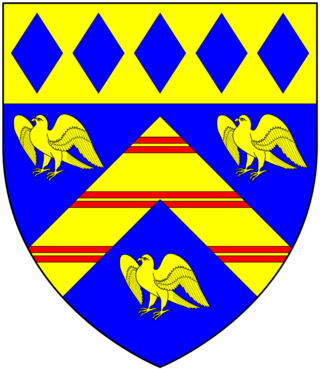
Baron Roborough, of Maristow in the County of Devon, is a title in the Peerage of the United Kingdom. It was created on 24 January 1938 for Sir Henry Lopes, 4th Baronet. He had earlier represented Grantham, Lincolnshire, in Parliament as a Conservative. The Baronetcy, of Maristow House in the County of Devon, had been created in the Baronetage of the United Kingdom on 1 November 1805 for Manasseh Masseh Lopes, a member of a wealthy family of Portuguese Jewish origin, with special remainder to his nephew Ralph Franco, son of his sister Maria. Manasseh Masseh Lopes converted to Christianity in 1802, and later represented Evesham, in Worcestershire, Barnstaple in Devon, and Westbury in Somerset, in Parliament. However, in 1819 he was twice convicted of bribing the voters in both Barnstaple and Grampound in order to be elected to Parliament, and was sentenced to imprisonment and heavy fines. He was also unseated by the House of Commons, but after his release from prison he nonetheless got elected for Westbury, a pocket borough which he controlled to a great extent.
The Stronge baronetcy of Tynan was conferred in the Baronetage of the United Kingdom on 22 June 1803. The family were northern Irish landowners of Tynan Abbey, County Armagh, also possessing the residence of Lizard Manor, Aghadowey, County Londonderry.

The Cooper, later Paston-Cooper, later Astley-Cooper Baronetcy, of Gadebridge in the County of Hertford, is a title in the Baronetage of the United Kingdom. It was created on 31 August 1821 for the noted surgeon and anatomist Astley Cooper, with remainder, in default of male issue, to his nephew Astley Paston Cooper, third son of his elder brother Reverend Samuel Lovick Cooper, who succeeded as second Baronet in 1841. The third and fourth Baronets used the surname of Paston-Cooper. The sixth Baronet used the surname of Astley-Cooper, which is also used by the seventh Baronet and present holder of the title.
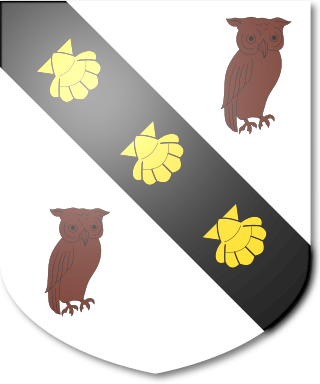
The Mactaggart Baronetcy, of King's Park in the City of Glasgow, is a title in the Baronetage of the United Kingdom. It was created on 2 February 1938 for John Mactaggart. He was a housing expert and the co-founder of the building firm Mactaggart & Mickel. The second Baronet was managing director of Mactaggart & Mickel. The third Baronet was chairman of the Society for Individual Freedom.
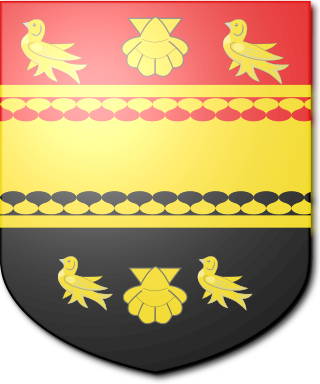
The Beecham Baronetcy, of Ewanville in the Parish of Huyton in the County Palatine of Lancaster, is a title in the Baronetage of the United Kingdom. It was created on 17 July 1914 for the Lancashire pill manufacturer Joseph Beecham. Joseph was succeeded by his eldest son, Thomas, a conductor who founded the London Philharmonic Orchestra in 1932.

The Baynes Baronetcy, of Harefield Place in the County of Middlesex, is a title in the Baronetage of the United Kingdom. It was created on 29 June 1801 for Christopher Baynes. He was Major-Commandant of the Uxbridge Gentlemen and Yeomanry Cavalry, which he helped to raise. The title descended from father to son until the death of his great-great-grandson, the fifth Baronet, in 1971. The late Baronet died unmarried and was succeeded by his first cousin, the sixth Baronet. He was the son of Reverend Malcolm Charles Baynes, fourth son of the third Baronet. As of 2023 the title is held by his grandson, the eighth Baronet, who succeeded his father in 2005.

The Peek Baronetcy, of Rousdon in the County of Devon, is a title in the Baronetage of the United Kingdom. It was created on 13 May 1874 for Henry Peek. He was an importer of spices, tea and other groceries, a philanthropist and Conservative Member of Parliament for Surrey Mid. The second Baronet was an astronomer and meteorologist; the third Baronet was high sheriff of Devon in 1912.
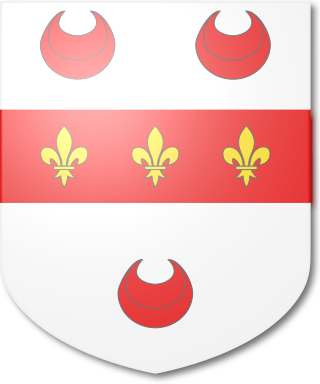
The Oakeley Baronetcy, of Shrewsbury, is a title in the Baronetage of Great Britain. It was created on 5 June 1790 for the Indian administrator Charles Oakeley. He served as Governor of Madras from 1790 to 1794. Frederick Oakeley was the second son of the first Baronet.
The Floyd Baronetcy is a title in the Baronetage of the United Kingdom. It was created on 30 March 1816 for General John Floyd. He was second-in-command at the Battle of Seringapatam in 1799. Floyd's daughter Julia was the wife of Prime Minister Sir Robert Peel, 2nd Baronet. The fifth Baronet was a Brigadier in the 15th/19th Hussars and was Chief-of-Staff of the Eighth Army from 1944 to 1945. Between 1961 and 1968 he served as Lord-Lieutenant of Buckinghamshire. The seventh Baronet was High Sheriff of Rutland in 1968. The fourth baronet's youngest son, Charles Murray Floyd, was a prominent businessman, surveyor and land agent.

The Fletcher, later Boughey Baronetcy, of Newcastle-under-Lyme and of Betley both in the County of Stafford, is a title in the Baronetage of Great Britain. It was created on 24 August 1798 for Thomas Fletcher, of Betley Court, Staffordshire, High Sheriff of Staffordshire in 1783 and 1789 and Deputy Lieutenant of the county. He was the husband of Elizabeth Fenton, granddaughter of George Boughey, of Audley, Staffordshire whose will provided for his great-grandson to inherit the Audley estate.

The Boynton baronetcy, of Barmston in the County of York, was a title in the Baronetage of England. It was created on 15 May 1618 for Matthew Boynton, son of Sir Francis Boynton of Barmston Hall, in the East Riding of Yorkshire. The Boyntons came to Barmston following the marriage of heiress Margaret de la See to Sir Henry Barmston in the 15th century. The first Baronet married Francis Griffith, heiress of an estate at Burton Agnes including Burton Agnes Hall and Burton Agnes Manor House which the second Baronet inherited in 1647. The fifth and sixth Baronets both served as High Sheriff of Yorkshire, in 1750 and 1771 respectively. The eleventh Baronet died without male issue and the Baronetcy passed to his cousin. His estates however passed to his daughter Cicely whose husband Thomas Lamplugh Wickham changed his name on marriage to Wickham-Boynton, and later (1989) to Cunliffe-Lister relations descended from Mary Constance Boynton, wife of the 1st Earl of Swinton. The title became extinct on the death of the thirteenth Baronet in 1966.

The Pocock Baronetcy, of Hart in the County Palatine of Durham and of Twickenham in the County of Middlesex, was a title in the Baronetage of the United Kingdom. It was created on 18 August 1821 for George Pocock, Member of Parliament for Bridgwater. He was the son of Admiral Sir George Pocock. The title became extinct on the death of the 4th Baronet in 1921.
The Leigh Baronetcy, of Altrincham in the County of Chester, was created in the Baronetage of the United Kingdom on 9 February 1918 for the newspaper proprietor and Conservative politician John Leigh. He was owner of the Pall Mall Gazette and represented Clapham in the House of Commons between 1922 and 1945. During World War I he funded the equipment of a hospital for wounded officers at Altrincham. As of 2023 the baronetcy is held by his grandson, Sir Christopher Leigh, 4th Baronet, who succeeded his brother in the title in 2021.

The White baronetcy, of Salle Park in the County of Norfolk, was created in the Baronetage of the United Kingdom on 29 June 1922 for Woolmer White. The second Baronet represented Fareham in the House of Commons.
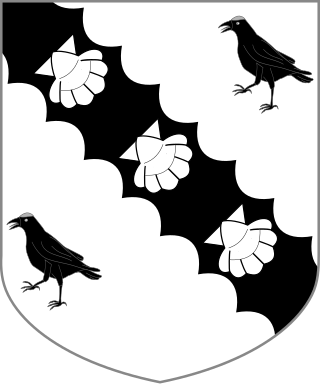
The Rowley baronetcy, of Hill House in the County of Berkshire, was created in the Baronetage of the United Kingdom on 21 March 1836 for the naval commander Admiral Charles Rowley. He was the fourth son of the 1st Baronet of the 1786 creation.

The Erskine baronetcy, of Cambo in the County of Fife, was created in the Baronetage of the United Kingdom on 27 August 1821 for David Erskine, a grandson through an illegitimate line of Thomas Erskine, 9th Earl of Kellie. The original baronetcy of Cambo became extinct on the death of the tenth Earl of Kellie in 1829.

The Lawson, later Howard-Lawson baronetcy, of Brough Hall in the County of York, was created in the Baronetage of the United Kingdom on 8 September 1841 for William Lawson. Born William Wright, he was the son of John Wright, of Kelvedon, by Elizabeth Lawson, daughter of the 5th Baronet of the 1665 creation whose surname he assumed in lieu of his Wright. His mother had previously inherited the Lawson family seat of Brough Hall.

The Lawson baronetcy, of Weetwood Grange in Headingley-cum-Burley in the West Riding of the County of York, was created in the Baronetage of the United Kingdom on 12 July 1900 for Arthur Lawson, chairman of Fairbairn Lawson Combe Barbour Ltd, and a director of the Great Eastern Railway and the Yorkshire Post.

















